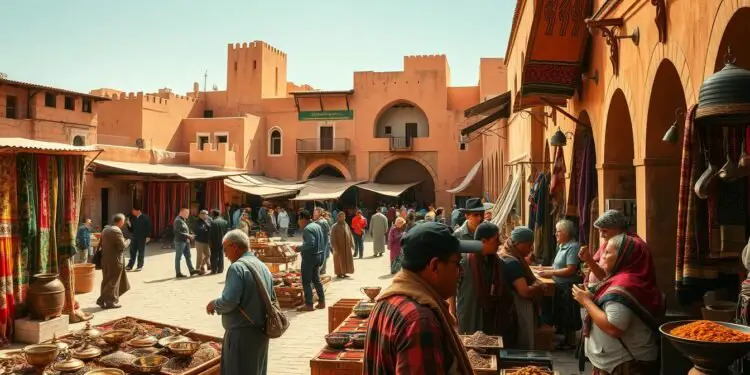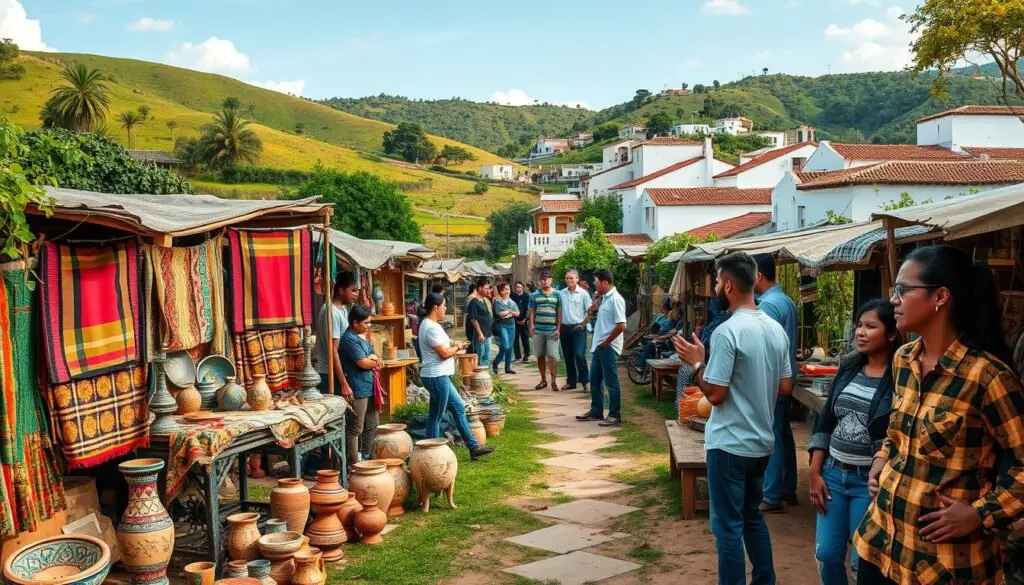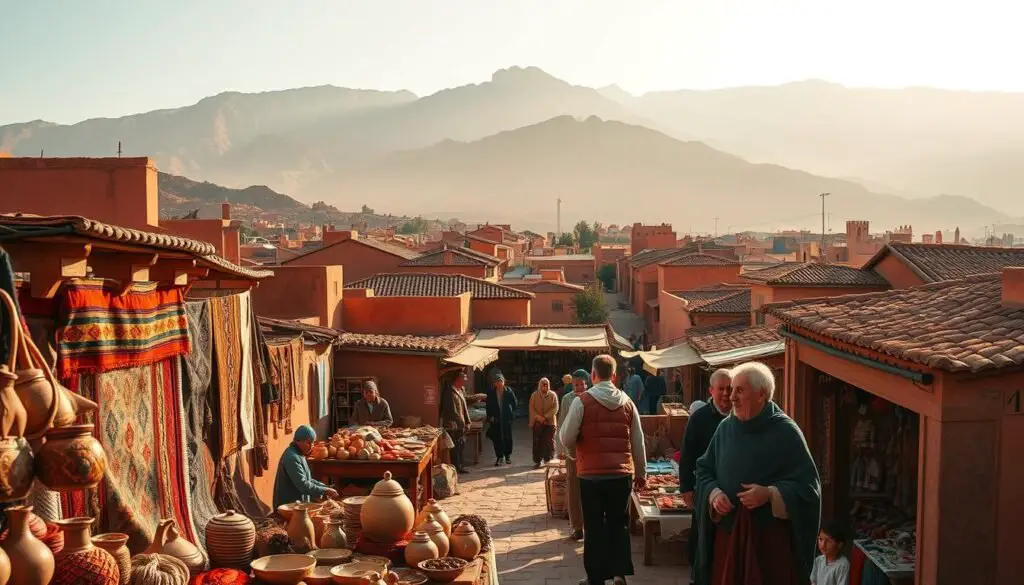What if the key to successful business growth lies not in big cities, but in small, traditional communities? Across Morocco, rural areas are proving that innovation thrives where heritage meets opportunity.
Leaders like Mohamed Horani of Hightech Payment Systems and Miloud Chaabi of Ynna Holding started with humble roots. Today, their ventures employ thousands and compete globally. These stories highlight how local skills translate into economic success.
From Atlas Mountain textiles to coastal fisheries, regional specialties fuel diverse industries. The CGEM business federation actively supports this growth, bridging tradition with modern markets.
Key Takeaways
- Rural areas blend craftsmanship with tech innovation.
- Business federations help scale local ventures.
- Ancestral skills power modern industries.
- Geographic diversity creates specialized markets.
- Village-led enterprises boost national GDP.
The Rise of Entrepreneurship from Moroccan Villages
Beyond urban centers, rural areas are proving to be unexpected hubs for business innovation. Here, centuries-old traditions blend seamlessly with modern market demands, creating unique opportunities.
How Rural Communities Foster Business Innovation
In tight-knit communities, the douar system fuels startups. Extended families pool resources, turning ancestral skills into thriving ventures. This model has sustained businesses for generations.
Brahim Slaoui’s Mafoder exemplifies this. What began as a small foundry in 1984 now supplies metal infrastructure to 18 Iraqi cities. Similarly, Saham Group employs bilingual staff in rural call centers, tapping into local language skills.
Key Industries Thriving in Village Settings
Berber women’s cooperatives dominate the argan oil trade, leveraging traditional harvesting methods. These groups empower female artisans while preserving cultural heritage.
Meanwhile, GFI Maroc bridges tradition with tech. Their cloud-based ERP solutions serve 200+ clients, including government agencies. This contrast—pottery workshops alongside software firms—defines rural economic diversity.
From metalworks to textiles, these enterprises prove that global business demand starts at the local level. Family-run ventures, backed by decades of expertise, are rewriting economic rules.
Inspiring Stories of Moroccan Village Entrepreneurs
Hidden in the heart of tradition, success stories emerge where heritage fuels modern business. These narratives reveal how local ingenuity transforms into global ventures.
Folks & Tales: Blending Tradition with Modernity
One designer traveled 2,000km to document 47 artisan techniques. The result? A brand that reverse-engineered medieval mosaics using CAD software.
Today, Folks & Tales bridges centuries-old patterns with contemporary design. Their work preserves cultural identity while meeting modern demand.
Chaimae Bahi Slaoui’s Grassroots Empowerment Initiative
Chaimae trained 1,000+ students through U.S.-Morocco partnerships. Her mentorship spawned 30+ businesses, from textiles to tech startups.
She focuses on cross-generational knowledge, like saffron farming cooperatives. Here, elders teach sustainable practices to young entrepreneurs.
Mafoder’s Journey from Local Foundry to Global Exporter
Brahim Slaoui’s family-run foundry began in 1984. Now, it supplies metal infrastructure to 18 Iraqi cities and holds ISO certification for European markets.
Mafoder’s success lies in its apprenticeship model. It trains Chefchaouen youth in woodcarving, ensuring skills survive for years.
Challenges and Opportunities for Rural Entrepreneurs
Digital deserts and transport bottlenecks challenge rural ventures, but creative solutions are emerging. Shared trucks move 73% of goods from production sites, causing delays for time-sensitive business operations.
Saloua Karkri Belkeziz developed cloud-based inventory tools to help artisans track shipments. Her system uses SMS alerts, bridging the 37% internet penetration gap in villages versus 82% in cities.
Microgrants transformed Chaimae Bahi Slaoui’s initiative, cutting dropout rates from 60% to 15%. This model empowers communities to formalize traditional trades, with AFEM programs boosting female-led startups by 40%.
CGEM’s incubators offer three-year tax holidays and access to export resources. Despite EU trade deals, only 12% of small ventures reach international markets due to complex paperwork.
Hybrid models like digital cooperatives combine elders’ experience with e-commerce platforms. These adapt ancestral handicraft techniques for global buyers while preserving cultural authenticity.
Conclusion: The Lasting Impact of Village-Led Entrepreneurship
Traditional skills meet modern markets, proving that people hold the power to shape economies. The experience of ventures like Ynna Holding and Saham Group shows how local roots can fuel global success.
Initiatives like Project 2030 aim to bring solar-powered tech hubs to remote areas. This vision supports both life and livelihoods while preserving cultural heritage.
Programs empowering artisans and expanding trade corridors reveal untapped potential. As Folks & Tales reminds us: “Our past designs your future.” The world is taking notice.
FAQ
What industries thrive in Moroccan villages?
Handicrafts, agriculture, textiles, and artisanal products dominate. Many businesses blend traditional skills with modern markets.
How do rural communities support business growth?
Tight-knit networks, shared knowledge, and local resources help entrepreneurs. Cooperatives and family-run setups are common.
Who is Chaimae Bahi Slaoui?
A changemaker empowering women through grassroots projects. Her work focuses on skill-building and economic independence in villages.
What challenges do rural entrepreneurs face?
Limited access to funding, infrastructure gaps, and market reach are hurdles. Yet, digital tools now help bridge some gaps.
Can small village businesses compete globally?
Yes. Brands like Mafoder prove local craftsmanship can attract international buyers. E-commerce expands their reach.




